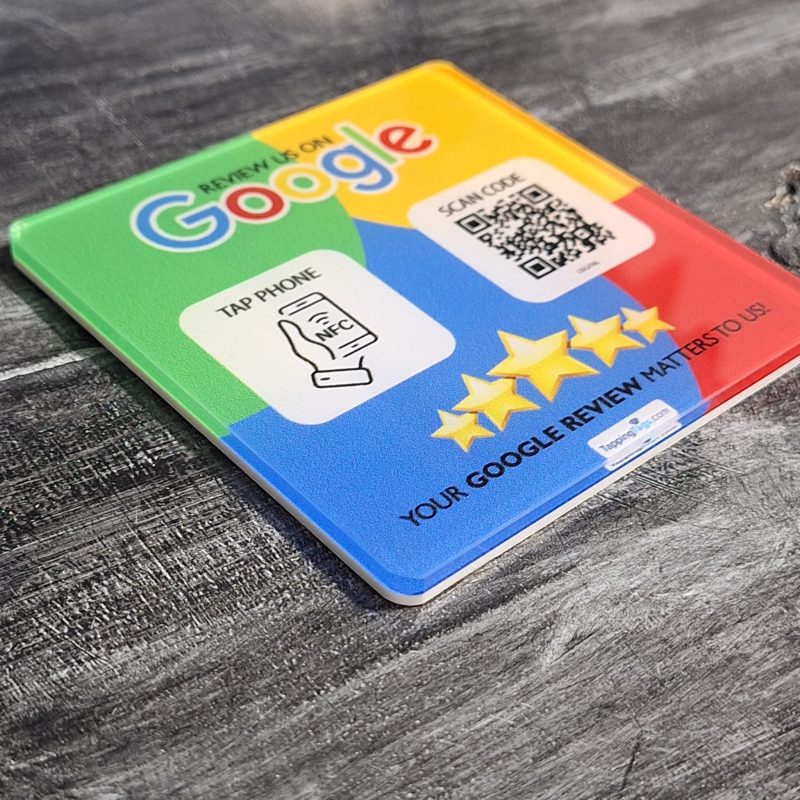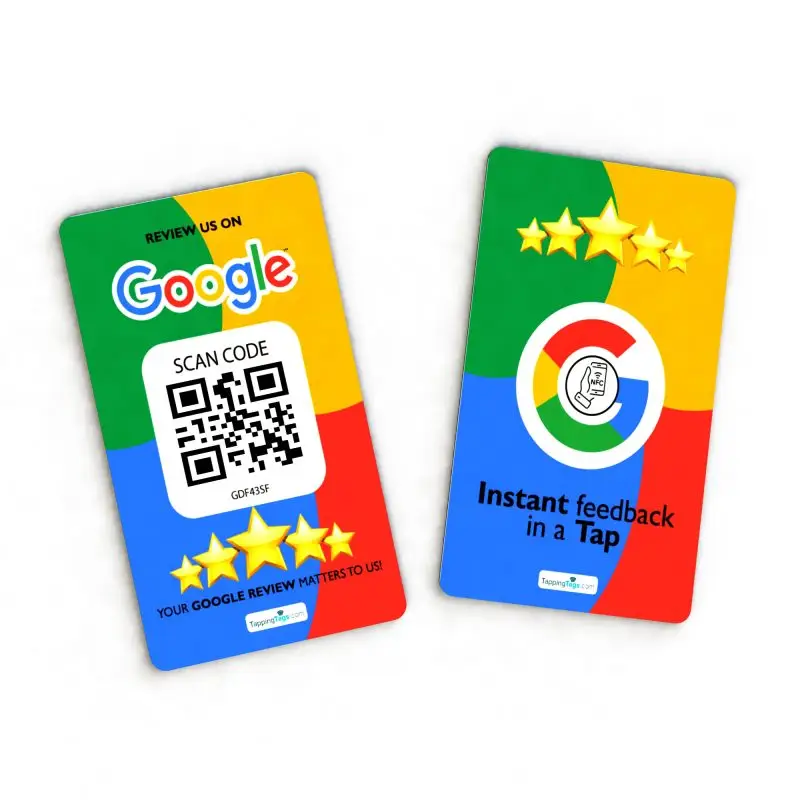Blog
Strategies for Improving Your Online Reputation
In today’s digital landscape, maintaining a positive online reputation is crucial for businesses of all sizes. With consumers increasingly relying on online reviews to make purchasing decisions, implementing effective strategies for improving your online reputation can significantly impact your success. One innovative solution that stands out is Tapping Tags’ Google Review NFC card, which leverages cutting-edge NFC technology to streamline the customer feedback process. By allowing customers to leave reviews with a simple tap of their NFC-enabled smartphones, businesses can enhance customer engagement and boost their online visibility. This not only fosters trust among potential customers but also contributes to improved search engine optimization (SEO), making your business more discoverable on platforms like Google. In this blog, we will explore various strategies for enhancing your online reputation, including how Tapping Tags’ solutions can help you collect valuable feedback effortlessly and effectively. Whether you’re a mobile service provider or a brick-and-mortar store, these strategies will empower you to dominate your market and attract more customers through increased positive reviews.
Building a Strong Personal Brand Through Consistent Messaging
In today’s digital landscape, building a strong personal brand is essential for anyone looking to enhance their online reputation. A personal brand is not just about how others perceive you; it is a reflection of your values, skills, and the unique qualities that set you apart from others. Consistent messaging plays a pivotal role in shaping this brand. When your messaging is coherent and aligned across all platforms, it fosters trust and recognition among your audience.
To establish a strong personal brand, it is crucial to define your core message. This involves identifying what you stand for, your mission, and the value you bring to your audience. Once you have a clear understanding of your brand identity, you can begin to communicate this message consistently across various channels, including social media, your website, and professional networks.
Consistency in messaging does not mean repeating the same words or phrases; rather, it involves maintaining a unified tone, style, and core message that resonates with your audience. For instance, if you are a digital marketing expert, your messaging should reflect your expertise, insights, and the solutions you offer. This can be achieved through blog posts, social media updates, and even in your interactions with clients and colleagues.
Moreover, leveraging storytelling can significantly enhance your personal brand. Sharing your journey, experiences, and lessons learned not only humanizes your brand but also makes it relatable. According to a study by the Harvard Business Review, stories are 22 times more memorable than facts alone. This statistic underscores the importance of weaving narratives into your messaging to create a lasting impact.
Engagement is another critical aspect of consistent messaging. Actively interacting with your audience through comments, messages, and discussions helps reinforce your brand. Responding to inquiries and feedback in a timely manner demonstrates your commitment to your audience and strengthens your reputation.
Visual elements also play a vital role in personal branding. Consistent use of colors, logos, and imagery across your platforms can enhance recognition and create a cohesive brand identity. For example, if you use a specific color palette for your website, ensure that your social media profiles reflect the same aesthetic. This visual consistency helps in creating a memorable brand image.
Additionally, monitoring your online presence is essential for maintaining a strong personal brand. Regularly checking what others are saying about you and addressing any negative feedback promptly can help mitigate potential damage to your reputation. Tools like Google Alerts can notify you whenever your name is mentioned online, allowing you to stay informed and proactive.
In conclusion, building a strong personal brand through consistent messaging is a multifaceted process that requires clarity, engagement, and visual coherence. By defining your core message, leveraging storytelling, engaging with your audience, maintaining visual consistency, and monitoring your online presence, you can effectively enhance your online reputation. Remember, your personal brand is an ongoing journey, and staying true to your values while adapting to the evolving digital landscape is key to long-term success.
For further insights on improving your online reputation, consider exploring more about strategies and best practices that can help you navigate the complexities of personal branding.
References:
- Harvard Business Review. (2016). The Science of Storytelling: Why Stories Are More Memorable Than Facts. Retrieved from https://hbr.org/2016/10/the-science-of-storytelling-why-stories-are-more-memorable-than-facts
- Forbes. (2020). 10 Ways to Build Your Personal Brand Online. Retrieved from https://www.forbes.com/sites/forbescoachescouncil/2020/01/30/10-ways-to-build-your-personal-brand-online/?sh=5a4d6e1e7e1e
- Inc. (2019). The Importance of Personal Branding in the Digital Age. Retrieved from https://www.inc.com/jeff-haden/the-importance-of-personal-branding-in-the-digital-age.html
Engaging with Your Audience: The Key to Positive Online Interactions
Engaging with your audience is a fundamental aspect of building and maintaining a positive online reputation. In today’s digital landscape, where consumers have access to a wealth of information and platforms to express their opinions, fostering meaningful interactions with your audience can significantly influence how your brand is perceived. The key to successful engagement lies in understanding your audience’s needs, preferences, and behaviors. By actively listening and responding to their feedback, you can create a sense of community and trust that enhances your reputation.
One effective strategy for engaging your audience is to utilize social media platforms. These platforms provide an excellent opportunity to connect with your audience in real-time. By sharing valuable content, responding to comments, and participating in conversations, you can demonstrate that you value their input and are committed to building a relationship. Regularly posting updates, promotions, and behind-the-scenes content can keep your audience informed and interested in your brand. Additionally, hosting live Q&A sessions or webinars can further enhance engagement by allowing your audience to interact directly with your team.
Another important aspect of audience engagement is personalization. Tailoring your communication to meet the specific needs and interests of your audience can significantly improve their experience with your brand. This can be achieved through targeted email marketing campaigns, personalized recommendations based on previous interactions, and segmenting your audience to deliver relevant content. By making your audience feel recognized and valued, you can foster loyalty and encourage positive word-of-mouth.
Moreover, encouraging user-generated content can be a powerful way to engage your audience. When customers share their experiences with your products or services, it not only provides social proof but also creates a sense of community among your audience. You can incentivize user-generated content by running contests or featuring customer stories on your website or social media channels. This not only boosts engagement but also enhances your brand’s authenticity and relatability.
Listening to your audience is equally crucial. Monitoring online conversations about your brand through social listening tools can provide valuable insights into customer sentiment and preferences. By addressing concerns and responding to feedback, you can demonstrate that you are attentive to your audience’s needs. This proactive approach can help mitigate negative perceptions and reinforce a positive image of your brand.
Furthermore, providing exceptional customer service is a vital component of audience engagement. Quick and effective responses to inquiries or complaints can turn a potentially negative experience into a positive one. By being accessible and responsive, you can show your audience that you care about their satisfaction and are willing to go the extra mile to resolve any issues. This not only enhances your reputation but also encourages repeat business and referrals.
In addition to these strategies, creating valuable content that resonates with your audience can significantly enhance engagement. Whether through blog posts, videos, or infographics, providing informative and entertaining content can keep your audience coming back for more. By addressing topics that matter to your audience and offering solutions to their problems, you can position your brand as a trusted resource in your industry.
Finally, measuring the effectiveness of your engagement strategies is essential for continuous improvement. Utilizing analytics tools to track engagement metrics such as likes, shares, comments, and website traffic can help you understand what resonates with your audience. By analyzing this data, you can refine your approach and ensure that your engagement efforts align with your audience’s preferences.
In conclusion, engaging with your audience is a critical element of maintaining a positive online reputation. By leveraging social media, personalizing communication, encouraging user-generated content, listening to feedback, providing exceptional customer service, creating valuable content, and measuring your efforts, you can foster meaningful interactions that enhance your brand’s image. For more insights on improving your online reputation, consider exploring our home page or learning more about our about us section. If you have any questions or need assistance, feel free to contact us.
In conclusion, improving your online reputation is an ongoing process that requires consistent effort and strategic planning. By actively managing your online presence, engaging with your audience, and addressing any negative feedback promptly, you can build a positive image that reflects your values and expertise. Implementing strategies such as creating high-quality content, leveraging social media, and utilizing online reviews can significantly enhance your reputation. Remember, transparency and authenticity are key; being genuine in your interactions fosters trust and loyalty among your audience. As you navigate the digital landscape, stay proactive and adaptable, and you will not only protect your reputation but also cultivate a strong and positive online identity that can lead to greater opportunities and success.
-
 Google Review NFC and QR Code Acrylic Stand
Rated 5.00 out of 5
Google Review NFC and QR Code Acrylic Stand
Rated 5.00 out of 5$75.00Original price was: $75.00.$38.50Current price is: $38.50. -
 Google Review NFC & QR Code Acrylic Tag with Sticker
Rated 5.00 out of 5
Google Review NFC & QR Code Acrylic Tag with Sticker
Rated 5.00 out of 5$49.00Original price was: $49.00.$27.00Current price is: $27.00. -
 Google Review NFC and QR Code Card - Tap or Scan
Rated 5.00 out of 5$18.90 – $98.90Price range: $18.90 through $98.90
Google Review NFC and QR Code Card - Tap or Scan
Rated 5.00 out of 5$18.90 – $98.90Price range: $18.90 through $98.90
